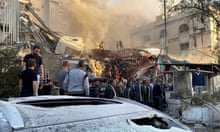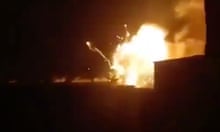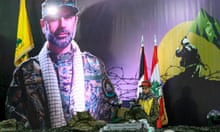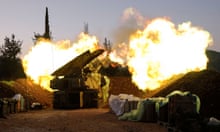Saad Hariri has unexpectedly resigned as Lebanon’s prime minister, citing Iranian influence across the region and claiming he feared the same fate as his assassinated father if he remained leader.
In a speech delivered from the Saudi capital of Riyadh on Saturday, Hariri blindsided both his government and staff in Beirut, bringing a dramatic end to an 11-month government that had largely failed to impose authority on a parliament split along regional lines, or on an economy weighed down by debt and corruption.
The timing and location of the announcement suggested more was at stake than the immediate future of Lebanon. Saudi Arabia, a Hariri patron, has been rallying support in recent weeks to challenge its rival Iran, which it believes is months away from securing unprecedented influence in the region.
It also followed sharpened anti-Iran rhetoric from Washington, and the release during the week of a trove of documents seized from Osama bin Laden’s hideout in 2011, which appear to suggest that al-Qaida received support from Iranian officials.
Hariri said Iran “has a desire to destroy the Arab world and has boasted of its control of the decisions in all the Arab capitals. Hezbollah imposed a reality in Lebanon through force of arms, and their intervention causes us big problems with all our Arab allies”.
The Saudi minister for gulf affairs, Thamer al-Sabhan, who is a vocal critic of Iran, tweeted: “The hands of treachery and aggression will be cut off.”
Before Hariri’s resignation, several senior officials from Barack Obama’s administration had said a series of coordinated messages in Washington and Riyadh was building a case for military confrontation with Iran. Saturday’s announcement is likely to add to those concerns and increase fears of a clash between Hezbollah and Israel, which fought a devastating war in 2006.
The CIA chief, Mike Pompeo, has been one of the Trump administration’s most hawkish figures on Iran, and declassifying the documents was seen as a step toward winding back the nuclear deal, which was the centrepiece of Obama’s foreign policy.
Pompeo and Trump’s key national security advisers have all said Iran has made significant gains in the region, both in its fight against Islamic State and through its robust support for the Syrian leader, Bashar al-Assad.
Iranian-backed forces took the Iraqi town of Qaim from Isis on Saturday in conjunction with the Iraqi military and Syrian army units after a series of victories along the border.
Iraqi paramilitary commanders and regional intelligence chiefs have said Iranian proxies are perhaps two months away from securing a land corridor across Iraq and Syria, which will eventually reach the Mediterranean city of Tartous.
Recent battles along the Euphrates river valley are essential to the plan to remove physical barriers along the entire route of about 1,180 miles (1,900km), which would be secured by loyal populations.
Hezbollah has played a prominent role in securing Assad’s position in Syria and clearing Lebanon’s borders, ostensibly from an extremist threat. The net effect has been a consolidation of Iran’s influence along the length of the corridor, and a sharp rise in its political and military roles in Baghdad, Damascus and Beirut.
Saudi officials, led by Crown Prince Mohammed bin Salman, met Hariri several times this week before the Lebanese leader’s resignation in Riyadh, where he spent much of his time between leaving Lebanon in early 2011 and returning to form a government in December last year.
Back in exile, he told Saudi leaders he had escaped an assassination attempt – unlike his father, the former leader Rafiq Hariri, who was killed by a large car bomb on Valentine’s Day in 2005. Five members of Hezbollah, including the group’s then deputy military commander are on trial in absentia in The Hague for allegedly plotting the killing.
Hariri returned to Lebanon last year to form a government after falling out with his hosts in Riyadh, who had demanded he do more to curb Hezbollah’s political muscle. He had also been hit by the downturn in the Saudi construction sector, with a company he chaired, Saudi Oger, being unable to pay debts to the kingdom.
During his brief second reign as prime minister Hezbollah’s dominance of Lebanese politics increased. Saudi officials and Hariri claim the political bloc-cum-militia effectively controls most instruments of state.
Lebanese security forces said they had no knowledge of any plot to kill the former leader.
Additional reporting by Nadia al-Faour










